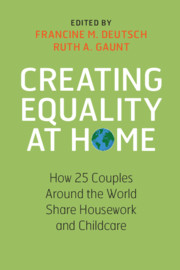Book contents
- Creating Equality at Home
- Advance Praise for Creating Equality at Home
- Creating Equality at Home
- Copyright page
- Dedication
- Contents
- Contributors
- Acknowledgments
- Development and Gender Equality in Participating Countries
- Setting the Stage
- Consciously Creating Equality
- Violating Social Norms
- Prioritizing Family
- Drawing on Lessons from Families of Origin
- Using Government Policies
- What We Have Learned
- Index
- References
What We Have Learned
Published online by Cambridge University Press: 03 June 2020
- Creating Equality at Home
- Advance Praise for Creating Equality at Home
- Creating Equality at Home
- Copyright page
- Dedication
- Contents
- Contributors
- Acknowledgments
- Development and Gender Equality in Participating Countries
- Setting the Stage
- Consciously Creating Equality
- Violating Social Norms
- Prioritizing Family
- Drawing on Lessons from Families of Origin
- Using Government Policies
- What We Have Learned
- Index
- References
- Type
- Chapter
- Information
- Creating Equality at HomeHow 25 Couples around the World Share Housework and Childcare, pp. 345 - 394Publisher: Cambridge University PressPrint publication year: 2020

